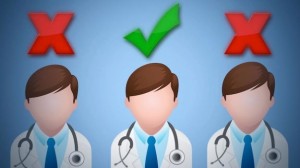Social Media May Be Better Than Tests And Credentials At Identifying Good Doctors
 I am consistently bemused by those who recommend more rigorous or more pervasive standardized testing as the primary means for insuring physician quality. The vast majority of physicians have already passed through a complex gauntlet of multiple choice exams, extended credentialing and certification processes, and lengthy tests of knowledge and skill. And yet, some physicians (to put it bluntly, sorry friends) are very bad at what they do.
I am consistently bemused by those who recommend more rigorous or more pervasive standardized testing as the primary means for insuring physician quality. The vast majority of physicians have already passed through a complex gauntlet of multiple choice exams, extended credentialing and certification processes, and lengthy tests of knowledge and skill. And yet, some physicians (to put it bluntly, sorry friends) are very bad at what they do.
Intellectual intelligence is necessary, but not sufficient, for doctoring. It is emotional intelligence (EI) that is sorely lacking – because it has neither been cultivated, nor selected for, by many training programs. Some educators openly acknowledge the problem, pointing to “extra-curricular activities” as their primary means of distinguishing equally qualified applicants. The disappointing reality is that non-academic performance may be a tie-breaker for students with similar standardized test scores, but raw scores almost always trump any other factor. In the end, we have a physician work force that is highly adept at assimilating and regurgitating facts, but is only accidentally good at human interactions.
Is there hope for change in this arena? I believe that the prognosis is guarded. As our culture becomes more and more digital data-driven, a tsunami of “meaningless use” threatens to drown us all in false quality measures, electronic medical record documentation “quality assurance” requirements, and analysis of trends without comprehension of context or influencing variables outside the scope of the measuring instruments. Lies, damn lies, and statistics. We can’t get enough! And guess who are the biggest proponents of these methods? Why, people who only excel at standardized testing – mostly because their true flaws also lie outside the measuring instruments. Bad doctors (sometimes turned-administrators) themselves are often fueling the onslaught of fruitless quality improvement initiatives.
Dr. Howard Luks, orthopedic surgeon and social media activist, wrote a provocative blog post on the subject of why physicians don’t engage more in social media. He suggests that many avoid it because they lack people-skills in the first place and don’t genuinely enjoy engaging with patients. If you’re a “jerk” in real life, he argues, then what advantage is there to making that more obvious on blogs, Facebook, Twitter, etc.? Better to stay socially quiet.
The interesting thing is that social media might be the most reliable way to discover whether or not your doctor is kind, thoughtful, observant, and detail-oriented. Reading a physician’s thoughts online can help you get to know their true personality and work ethic. In the future it would be nice if medical schools and residency training programs took the time to read applicants’ blogs (for example) instead of crunching their test scores for admission via the path of least resistance. An extra hour of reading up front could save our medical system from a new wave of low EI providers.
As Seth Godin put it, “Uncaring hands are worth avoiding.”
We all recognize the importance of this statement intuitively, but have a hard time quantifying “caring” with standardized tests. That’s why admissions officers and patients alike must use their judgment when selecting doctors. We pay verbal homage to the importance of “clinical judgment” in medicine but in reality are culturally afraid of straying from numbers to support our decision-making.
How will you know a good doctor? You’ll know him [or her obviously] when you see him. And sometimes you can see him best on social media platforms.
***
A few caveats of course:
1. Social Media is a sensitive but not specific test. Meaning, you can probably accurately identify caring doctors from their blogs, etc. but if they don’t have one, it doesn’t mean they aren’t good/caring.
2. It may not matter if you find a great doctor online if they’re not in your limited ACA network. 😕
3. Direct primary care is a potentially excellent way to get connected to exceptional doctors. I am a fan of this movement and have been actively involved in a practice in VA. The practices can reduce costs and enhance quality care, though recent caps on Health Savings Accounts (initiated by the Obama administration) have reduced consumer freedom to spend pre-tax income on direct primary care.















